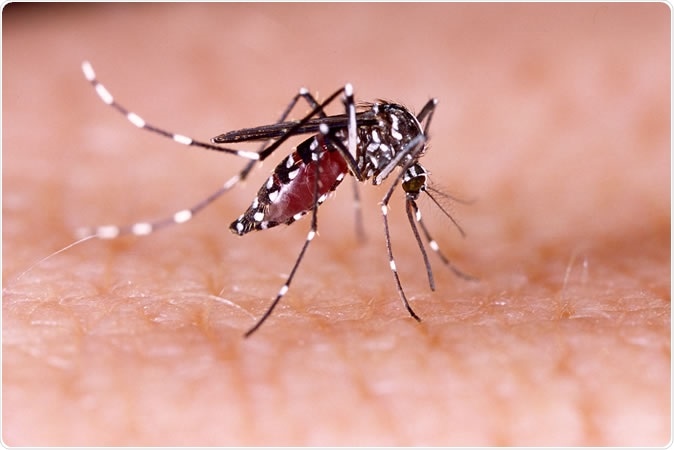The immune boost was due to the effect of halofuginone, which produces a metabolic situation that simulates the body’s condition when exposed to a situation of acute amino acid deficiency. This triggers an alternative pathway for antibody synthesis that results in meaner and more plentiful antibodies that neutralize the dengue virus more effectively.
Many studies show that eating a diet that supplies lower amounts of protein is key to living a healthy life, preventing age-related diseases and prolonging the lifespan. A low-protein diet also modulates immune function. The current research, carried out between scientists at the University of Hyderabad in India and the Cornell University College of Veterinary Medicine, shows that halofuginone can be useful as a strategy to enhance vaccine efficacy in dengue and in other hard-to-control illnesses.
Protein restriction is already known to affect the way the immune system functions in many ways. Thus, the researchers explored how this pathway could be potentially useful in modulating immune response to a vaccine.
Halofuginone – amino acid starvation response
Halofuginone is an herbal compound used in traditional Chinese medicine. Its utility in treating muscular dystrophy is being explored, as well as in autoimmune disease and some cancers. Its use has not been associated with side effects.
Prior research has shown that halofuginone kickstarts a metabolic response called the amino acid starvation response that is more typical in a situation in which the body is not supplied with proteins. The way it works is to activate a key stress-induced enzyme called nutrient-sensing kinase GCN2, which inhibits the translation initiation factor Eif2α within immune cells. This molecule is involved in the binding of specific amino acids to produce a protein chain at the site of protein synthesis.
Dengue
Dengue is among the top 10 threats to human existence, and flourishes in regions that are home to about 50% of the world’s people. It is caused by a virus that is transmitted by mosquitoes. Beginning with fever, headache and muscle pain, in most cases it resolves with good care. However, in about a fifth of all dengue victims, the illness becomes severe and causes a host of fatal complications such as internal bleeding and shock, and multiple organ failure.

Aedes aegypti mosquito on human skin. Image Credit: Tacio Philip Sansonovski / Shutterstock
The lack of a vaccine that can immunize individuals who have never come in contact with the virus has made it difficult to control the disease. This prompted the current study on halofuginone.
The study
The researchers took two groups of mice, some of which were given halofuginone injections while the second group was injected with a simple salt solution. Following the inoculations, a candidate dengue vaccine was given to mice in both groups.
They then looked at how the immune response to the vaccine varied in the two groups.
The findings
Mice who had been given halofuginone plus the vaccine showed a twofold rise in antibody titer compared to those who received only the latter. Moreover, these antibodies had greater binding affinity for components on the dengue virus.
The difficulty with using mice is that mice do not naturally develop dengue. As a result, the antibody titers can’t be translated into immunity to infection based on this experiment. However, the testing of the antibodies in the two groups showed that those produced by the first group were better at neutralizing the virus.
They also found that the way halofuginone works is because it promotes the formation of germinal centers within lymph nodes and spleen tissue. Germinal centers are where B cells are produced, the cells that synthesize antibodies, as well as memory B cells, which are particularly long-lived and preserve the memory of the antigen. It also enhances the production of IL-10, a cytokine that also seems to work with the increased germinal center activity to establish more long-lived memory B cells. This ensures that the next time the organism is exposed to the parasite, antibody production starts up almost immediately.
The researchers say, “We were particularly surprised by the quality of the antibody response, which is the important part. In this case the actual affinity of the antibodies for the virus particles was enhanced by the halofuginone.”
Halofuginone was also found to enhance immune antibody response to any of the four types of dengue virus, and the researchers think that it will work equally well with all vaccines.
Implications
Further studies are planned on elucidating how halofuginone affects T cell responses. These are the immune cells that detect foreign organisms, destroy cells that have been infected by viruses, and prime B cells to produce specific antibodies against the intruders, ramping up the defences still further.
Researcher Avery August comments, “This pathway hasn't before been thought of as one that can regulate enhancing vaccine memory. It allows us potentially to enhance the body's memory specifically for that vaccine.” The findings suggest that more research is warranted to find out how such drugs that bring about starvation-like metabolic conditions within the body could help increase the efficacy of vaccines. This could be a tremendous boost to develop vaccines for dengue and similar conditions that do not have approved vaccines currently.
Source:
Journal reference:
Amino acid starvation enhances vaccine efficacy by augmenting neutralizing antibody production, Sumbu Afroz, Shama, Srikanth Battu, Shaikh Matin, Sabrina Solouki, Jessica P. Elmore, Gillipsie Minhas, Weishan Huang, Avery August, and Nooruddin Khan, Science Signaling 12 Nov 2019: Vol. 12, Issue 607, eaav4717, DOI: 10.1126/scisignal.aav4717, https://stke.sciencemag.org/content/12/607/eaav4717